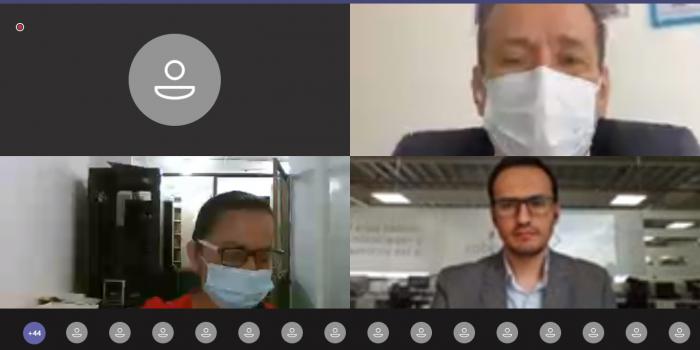
Leaders of victims Caguán Basin and Caqueta Piedmont received strengthening in participation
The Victims Unit opened a space to seek greater participation from those who suffered the conflict in this PDET sub-region in the south of the country.

For two days, the meeting was held to strengthen the participatory management of victims in the Development Programs with a Territorial Approach (PDET), with the Caguán sub-region and Caqueta foothills.
The session brought together approximately 85 victims from Caquetá and the municipality of Algeciras (Huila), who were interacting with officials from the Victims Unit, the Presidential Council for Consolidation and the Territory Renewal Agency (ART), to know first-hand the advances in social and community infrastructure, which have been obtained in 2020 and what is projected in the future in Pillar 8 of the PDET, related to peace, coexistence and reconciliation.
After having participated in several workshops and discussions, the victims worked on the preparation of a document as a product of the event, which marks the route to follow in their work for the benefit of the population affected by the conflict.
The activity was chaired by the general director of the Victims Unit, Ramón Rodríguez, who explained that the purpose of the day is to promote spaces to strengthen leaders in the subregions in relation to PDET initiatives, providing them with tools to participate actively of the different processes.
"These spaces allow us to tell the victims about the articulation work that has been carried out with the different entities so that they know how progress has been made in the peace agreements, within the framework of the Peace with Legality strategy and, in particular, in relation to to law 1448”, said Rodríguez.
He emphasized that it is essential for the State to repair the victims by contributing to reconciliation and ensuring that the acts of violence they suffered do not happen again. The official highlighted the emotional support provided to the victims and the strategies to bring them closer to the institutional offer to which they are entitled.
PDET programs
The coordinator of the PDET in Caquetá, Diana Cristina Gómez Reyes, announced the progress of the management in these departments and the status of the works for each municipality.
According to the work plan of the PDET Cuenca del Caguán and Piedemonte Caqueteño, it shows a consolidated of 259 initiatives and activities for the period 2020-2021, in pillar 8 with fully defined lines: strengthening the formulation and implementation of public policies that favor peace and promote co-responsible citizen participation; the implementation of transitional policies; community infrastructure for peace; justice for rurality; macro-strategy of rural security; social pedagogy and communication for reconciliation and the reconstruction of the social network.
The official highlighted the progress in terms of works on tertiary roads, as well as the productive projects that are now a reality in several municipalities with the lines of panela, cocoa, livestock, among others, that contribute to improving the local economy.
Participate legally
For her part, Lorena Mesa, deputy director general of the Victims Unit, pointed out that the 'Participaz con Legalidad' strategy promotes social pedagogy for peace, “so that victims can identify other ways of building from the community, seeking to consolidate the peace in their territories, with a human rights approach, in which they have been working hard”.
Work tables
The second day included the development of a workshop on participation for the leaders of the victims, who requested that a work schedule be made that is widely socialized, so that they know well in advance about the holding of meetings and events in which they can participate, in order to multiply the information with the target population.
In this regard, Jesús Sarria, delegate of the Victims' Roundtable, indicated that “it was clear that leaders have duties and rights as members of participation boards, and that therefore they must know their functions and commitments, in order to articulate the actions with the PDET, the mayors, legal representatives and the people's defense, international cooperation among other institutions”.
He added that, "as leaders of the victims of the conflict, we must empower ourselves in our territories, with their needs, and seek the spaces to make the concerns of the territory known to the Government in search of effective solutions, but also follow up, for this we must as leaders to show us the projects and strategies”.
For her part, Mayerli Rivas, coordinator of the Victims' Roundtable, pointed out that "so that development can reach the communities it is necessary to work hard." "The support of the municipal liaisons is very important and I wish the PDETs had offices in the municipalities so that the concerns of the victims are addressed first-hand", he added.
Ángel Miro Bedoya, coordinator of Curillo Victims Board, pointed out the need to know about each of the projects that are being developed and to be empowered by the PDET issues, breaking barriers such as poor connectivity and distances, as well as articulate and prepare before attending the different meetings, have robust themes achieving important spaces for dialogue”.
Finally, ART announced that three workshops will be held in November and December: one on communication for development, another on governance, and a last on an advocacy plan.
The Caguán and Piedemonte Caqueteño subregion groups together the departments of Huila and Caquetá and 17 municipalities: Algeciras, in Huila; and Florencia, Albania, Belén de los Andaquíes, Cartagena del Chairá, Curillo, El Doncello, El Paujil, La Montañita, Milan, Morelia, Puerto Rico, San José del Fragua, San Vicente del Caguán, Solano, Solita and Valparaíso, in Caquetá.
(Fin/NIL/LMY)






